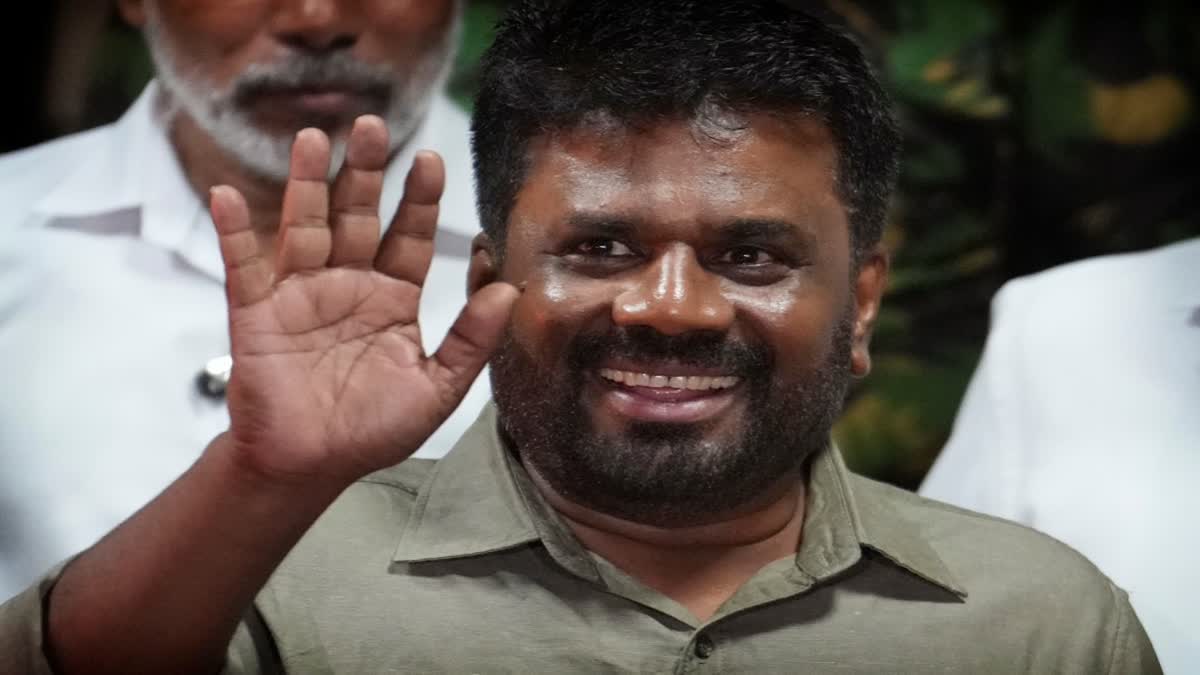New Delhi: As Sri Lanka goes for parliamentary elections on November 14, there are expectations of rise in youth power and relegation of the old guard amid a financial crisis that the Indian Ocean island nation is still trying to come out of.
This comes in the light of the election of Anura Kumara Dissanayake of the National People’s Power (NPP) alliance as President in September this year. Though a veteran politician, 55-year-old Dissanayake, popularly known as AKD, became the first elected president not from Sri Lanka's traditional political parties. The NPP alliance is ideologically left-wing populist and working-class-centred. The NPP is led by the Dissanayake’s Janatha Vimukthi Peramuna (JVP).
The Sri Lankan political landscape has traditionally been dominated by political elite, with established family dynasties and older political figures holding significant influence. This power structure was largely uninterrupted through decades, sustained by a focus on older, tried-and-tested leadership.
However, issues such as corruption, nepotism, economic mismanagement, and political inertia have disillusioned many citizens, especially younger Sri Lankans who feel disconnected from the established political class. The 2019 Easter Sunday bombings and the COVID-19 pandemic exacerbated frustrations, revealing deep-rooted vulnerabilities in governance and igniting a fresh call for accountability, transparency, and innovative leadership.
The economic crisis that struck Sri Lanka in 2022, marked by soaring inflation, shortages of essentials, and an unprecedented currency devaluation, impacted daily life. This spurred young Sri Lankans to demand answers from those in power, as many saw their career opportunities, standards of living, and overall futures at risk.
It is in light of this that there are expectations of an upsurge in youth power led by the NPP alliance in the upcoming parliamentary elections. Why this year’s Sri Lankan parliamentary elections assumes additional significance is because Dissanayake, who has been elected as the ninth Executive President, has promised to abolish the executive presidency system in Sri Lanka and restore the primacy of the parliament. According to the presidential election manifesto of the National People’s Power (NPP) alliance, representing which Dissanayake became President, the executive presidency will be abolished and the parliament will appoint the president of the country without any executive powers.
The NPP manifesto also states that a new constitution will be drafted and passed through a referendum with the necessary changes, if there any, after going through a public discourse.
So, what is changing in the Sri Lankan political landscape? Ex-Sri Lankan diplomat Sugeeswara Senadhira who served as media advisor to four former presidents and one prime minister explains to ETV Bharat in an exclusive interview over phone from Colombo. Excerpts from the interview:
Question: There is this perception that this year’s parliamentary elections will see a rise in youth power. Why is that?
Answer: In our parliament, over the last seven decades, we have mostly seen politicians between the ages of 50 and 70 sit in power. However, this time, 58 of the members of the last parliament have declined to contest. This time, a majority of seats is expected to go to the NPP alliance because they have a younger lot. People are going for a structural change.
Q: Former Presidents Ranil Wickremesinghe, Mahinda Rajapaksa and Gotabaya Rajapaksa are not standing in this year’s parliamentary elections. However, Wickremesinghe has appealed to the people to vote for veteran, experienced politicians if the country has to get out of the financial crisis. What is your opinion?
A: Wickremesinghe’s statement has some truth. The younger generation needs to be guided by the older generation. But then the older generation could not deliver. Hough Wickremesinghe helped Sri Lanka largely recover from the financial crisis, we are still facing problems.
Q: So, which party do you think will get the majority during the upcoming parliamentary elections?
A: In our parliament comprising 225 seats, 130 is the majority mark. The NPP alliance is expected come to attain a near majority by winning over 100 seats based on their youth power.
Q: An NPP leader, who is also a minister in President Dissanayake’s cabinet, has said that the alliance will be willing to form a national unity government even if it attains majority by including representatives of the Tamil and Muslim communities. Do you think this is likely?
A: There have been conflicting reports about this. It remains to be seen whether there will be any sharing of power at the centre.
Q: Leader of Opposition in the last parliament Sajith Premadasa of the Samagi Jana Balawegaya (SJB) party lost this year’s presidential election to Dissanayake. Now, Premadasa is again standing for the parliamentary elections hoping to be the prime minister. How do you see the SJB’s chances?
A: The SJB can be a major opposition. The party will get around 50 seats or so.
Q: Former President Mahinda Rajapaksa’s son Namal Rajapaksa of the Sri Lanka Podujana Peramuna (SLPP) party had also contested the presidential election but came a distant fourth. How do you see the SLPP’s chances in the parliamentary elections?
A: The SLPP is not a major contender this time around.
Q: In his presidential election manifesto, Dissanayake had promised to abolish the executive presidency position in Sri Lanka. Do you think that it is likely if the NPP alliance secures the majority in parliament?
A: Every president had said that before coming to power. But this did not happen after they came to power. To do that, you need two-thirds majority in parliament and also a national referendum. In 1977 (when the executive presidency was introduced), then President JR Jayewardene, who had 5/6th majority, had asked the parliament to sit as a constituent assembly and draft a new constitution and pass it. Under the new constitution, two-thirds majority is needed for such a move. Also, national referendum is also needed for fundamental changes.



